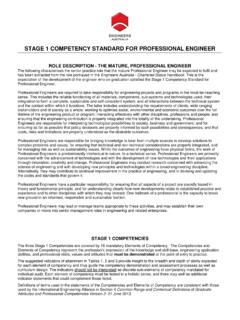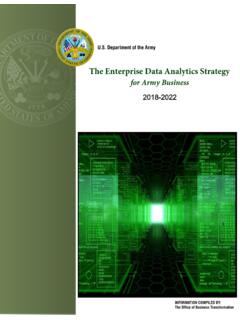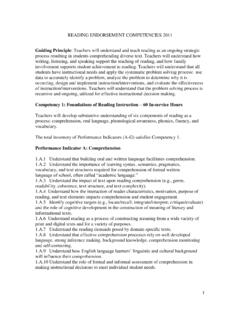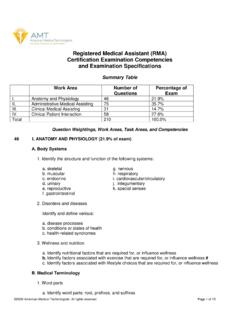Transcription of Competence Development in the Workplace: Concepts, …
1 Asia Pacific Education Review Copyright 2008 by Education Research Institute 2008, Vol. 9, , 5-20. 5 There is today a widespread belief in the importance of devoting resources to education and other forms of Competence Development as a key factor behind productivity Development , innovative capacity and competitiveness. This standpoint is not only an outflow of policy discussions about knowledge or learning economies, but has also received considerable support from research ( Lorenz & Lundvall, 2006). 1 In line with this view on the importance of education for growth and competitiveness, companies have in recent years devoted substantial resources to Competence Per-Erik Ellstr m, HELIX VINN Excellence Centre, Link ping University, Sweden; Henrik Kock, HELIX Graduate School, Link ping University, Sweden.
2 This study was supported by grants from the Swedish Governmental Agency for Innovation Systems. Correspondence concerning this article should be addressed to Per-Erik Ellstr m, HELIX VINN Excellence Centre, Link ping University, SE-581 83 Link ping, Sweden. e-mail: per-erik. Development . The principal arguments for these efforts stem from production economy considerations. These arguments concerns the altered and increased requirements on Competence that are assumed to follow in the wake of increased internationalization, new production concepts, a wider use of information technology and an increasingly dominant role for knowledge-intensive production in many companies (Adler, 2004; Brown, Green, & Lauder, 2001).
3 Issues of Competence Development in working life can, however, also be discussed on the basis of political considerations concerning the distribution of welfare and issues of democracy. Insufficient opportunities for education and on-the-job learning for groups of employees with a limited basic education tend to widen the existing education gaps in society (Rubenson, 2006). A further perspective that can be applied in this context, could be derived from work environment research. Studies indicate that a work environment that permits and stimulates learning and Competence Development may also be of fundamental importance for the employees health, well-being and Competence Development in the workplace .
4 Concepts, Strategies and Effects Per-Erik Ellstr m Henrik Kock Link ping University Sweden In spite of the expectations that exist regarding efforts to develop Competence and in spite of the large amounts of resources devoted to it, there is a marked lack of empirically-based research on Competence Development in companies and other organizations. The purpose of this article is to present a review of research on strategies for Competence Development in organizations, their prerequisites and effects. More specifically, the following three questions will be addressed: (i) Why do organizations invest in Competence Development ?
5 (ii) What effects can realistically be achieved through Competence Development ? (iii) What characterizes successful strategies for Competence Development in organizations? Before these questions are dealt with, different views of the meaning of the concepts of Competence and Competence Development are presented and discussed. Key words: Competence , Competence Development , workplace learning, strategies, effects Per-Erik Ellstr m, Henrik Kock 6personal Development (Karasek & Theorell, 1990). What, then, do we know about education and other forms of Competence Development in companies and other types of organizations?
6 In spite of the expectations that exist regarding efforts to develop Competence and in spite of the large amounts of resources devoted to it, there is a marked lack of empirically-based research on Competence Development in companies and other organizations. The purpose of this article is to present a review of research on strategies for Competence Development in organizations, their prerequisites and effects. More specifically, the following three questions will be addressed: (i) Why do organizations invest in Competence Development ?
7 (ii) What effects can realistically be achieved through Competence Development ? (iii) What characterizes successful strategies for Competence Development in organizations? However, before addressing these questions, it is appropriate to say something about the concepts of Competence and Competence Development as used in this paper. Three Views of Competence The concept of Competence is often poorly defined in the literature. In fact, a general consensus seems to be lacking concerning the meaning of this frequently used concept . One example may illustrate this point.
8 According to one view, Competence is considered as an attribute of the employee, that is, as a kind of human capital or a human resource that can be translated into a certain level of performance. According to another widely held view, Competence is defined in terms of the requirements of the tasks that constitute a certain job. This is indeed an important distinction, and in the following we will use the term Competence to refer to the former meaning, and the term qualification to refer to the latter meaning. More specifically, the term Competence will be used to refer to the capacity of an individual (or a collective) to successfully (according to certain formal or informal criteria, set by oneself or by somebody else) handle certain situations or complete a certain task or job (Ellstr m, 1997).
9 This capacity may be defined in terms of: perceptual motor skills ( dexterity); cognitive factors (different types of knowledge and intellectual skills); affective factors ( attitudes, values, motivations); personality traits ( self-confidence); and social skills ( communicative and co-operative skills). Using this definition as a point of departure, the notion of qualification may now be defined as the Competence that is actually required by the task, and/or is implicitly or explicitly prescribed, for example, by the employer. As implied by this distinction, an individual (or a collective) may possess a range of competencies that are not qualifications, that is, that are not required by the task(-s) at hand or prescribed by, for example, the employer.
10 Conversely, a certain job may require qualifications that do not correspond to the actual competencies of the individual (or the collective). Thus, the concept of qualification focuses on competencies that for one reason or another are valued by an internal or external labour market, that is, competencies that have an exchange value. In addition, it is in many situations necessary to make the following distinctions (for an extended discussion, see Ellstr m, 1997). First, given the view that Competence is an attribute of an individual, a distinction can be made between: (i) formal Competence , measured, for example, in terms of the years of schooling completed or by the credentials received by an individual and (ii) actual Competence , as defined above: the capacity of an individual to successfully handle a certain situation or to perform a certain task.

















